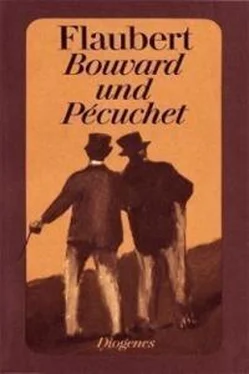"At Rambouillet the bodyguards bid him good–bye. He embarks, and during the entire passage is ill. End of his career.
"The importance possessed by the bridges ought here to be noticed. First, he exposes himself needlessly on the bridge of the Inn; he carries the bridge St. Esprit and the bridge of Lauriol; at Lyons the two bridges are fatal to him, and his fortune dies before the bridge of Sèvres.
"List of his virtues. Needless to praise his courage, to which he joined a far–seeing policy. For he offered every soldier sixty francs to desert the Emperor, and in Spain he tried to corrupt the Constitutionalists with ready money.
"His reserve was so profound that he consented to the marriage arranged between his father and the Queen of Etruria, to the formation of a new cabinet after the Ordinances, to the abdication in favour of Chambord—to everything that they asked him.
"Firmness, however, was not wanting in him. At Angers, he cashiered the infantry of the National Guard, who, jealous of the cavalry, had succeeded by means of a stratagem in forming his escort, so that his Highness found himself jammed into the ranks at the cost of having his knees squeezed. But he censured the cavalry, the cause of the disorder, and pardoned the infantry—a veritable judgment of Solomon.
"His piety manifested itself by numerous devotions, and his clemency by obtaining the pardon of General Debelle, who had borne arms against him.
"Intimate details; characteristics of the Prince:
"At the château of Beauregard, in his childhood, he took pleasure in deepening, along with his brother, a sheet of water, which may still be seen. On one occasion, he visited the barracks of the chasseurs, called for a glass of wine, and drank the King's health.
"While walking, in order to mark the step, he used to keep repeating to himself: 'One, two—one, two—one, two!'
"Some of his sayings have been preserved:—
"To a deputation from Bordeaux:
"'What consoles me for not being at Bordeaux is to find myself amidst you.'
"To the Protestants of Nismes:
"'I am a good Catholic, but I shall never forget that my distinguished ancestor was a Protestant.'
"To the pupils of St. Cyr, when all was lost:
"'Right, my friends! The news is good! This is right—all right!'
"After Charles X.'s abdication:
"'Since they don't want me, let them settle it themselves.'
"And in 1814, at every turn, in the smallest village:
"'No more war; no more conscription; no more united rights.'
"His style was as good as his utterance. His proclamations surpassed everything.
"The first, of the Count of Artois, began thus:
"'Frenchmen, your King's brother has arrived!'
"That of the prince:
'"I come. I am the son of your kings. You are Frenchmen!'
"Order of the day, dated from Bayonne:
"'Soldiers, I come!'
"Another, in the midst of disaffection:
"'Continue to sustain with the vigour which befits the French soldier the struggle which you have begun. France expects it of you.'
"Lastly, at Rambouillet:
"'The King has entered into an arrangement with the government established at Paris, and everything brings us to believe that this arrangement is on the point of being concluded.'
"'Everything brings us to believe' was sublime."
"One thing vexed me," said Bouvard, "that there is no mention of his love affairs!" And they made a marginal note: "To search for the prince's amours."
At the moment when they were taking their leave, the librarian, bethinking himself of it, showed them another portrait of the Duke of Angoulême.
In this one he appeared as a colonel of cuirassiers, on a vaulting–horse, his eyes still smaller, his mouth open, and his hair straight.
How were they to reconcile the two portraits? Had he straight hair, or rather crisped—unless he carried affectation so far as to get it curled?
A grave question, from Pécuchet's point of view, for the mode of wearing the hair indicates the temperament, and the temperament the individual.
Bouvard considered that we know nothing of a man as long as we are ignorant of his passions; and in order to clear up these two points, they presented themselves at the château of Faverges. The count was not there; this retarded their work. They returned home annoyed.
The door of the house was wide open; there was nobody in the kitchen. They went upstairs, and who should they see in the middle of Bouvard's room but Madame Bordin, looking about her right and left!
"Excuse me," she said, with a forced laugh, "I have for the last hour been searching for your cook, whom I wanted for my preserves."
They found her in the wood–house on a chair fast asleep. They shook her. She opened her eyes.
"What is it now? You are always prodding at me with your questions!"
It was clear that Madame Bordin had been putting some to her in their absence.
Germaine got out of her torpor, and complained of indigestion.
"I am remaining to take care of you," said the widow.
Then they perceived in the courtyard a big cap, the lappets of which were fluttering. It was Madame Castillon, proprietress of a neighbouring farm. She was calling out: "Gorju! Gorju!"
And from the corn–loft the voice of their little servant–maid answered loudly:
"He is not there!"
At the end of five minutes she came down, with her cheeks flushed and looking excited. Bouvard and Pécuchet reprimanded her for having been so slow. She unfastened their gaiters without a murmur.
Then they went to look at the chest. The bakehouse was covered with its scattered fragments; the carvings were damaged, the leaves broken.
At this sight, in the face of this fresh disaster, Bouvard had to keep back his tears, and Pécuchet got a fit of nervous shivering.
Gorju, making his appearance almost immediately, explained the matter. He had just put the chest outside in order to varnish it, when a wandering cow knocked it down on the ground.
"Whose cow?" said Pécuchet.
"I don't know."
"Ah! you left the door open, as you did some time ago. It is your fault."
At any rate, they would have nothing more to do with him. He had been trifling with them too long, and they wanted no more of him or his work.
"These gentlemen were wrong. The damage was not so great. It would be all settled before three weeks." And Gorju accompanied them into the kitchen, where Germaine was seen dragging herself along to see after the dinner.
They noticed on the table a bottle of Calvados, three quarters emptied.
"By you, no doubt," said Pécuchet to Gorju.
"By me! never!"
Bouvard met his protest by observing:
"You are the only man in the house."
"Well, and what about the women?" rejoined the workman, with a side wink.
Germaine caught him up:
"You'd better say 'twas I!"
"Certainly it was you."
"And perhaps 'twas I smashed the press?"
Gorju danced about.
"Don't you see that she's drunk?"
Then they squabbled violently with each other, he with a pale face and a biting manner, she purple with rage, tearing tufts of grey hair from under her cotton cap. Madame Bordin took Germaine's part, while Mélie took Gorju's.
The old woman burst out:
"Isn't it an abomination that you two should be spending days together in the grove, not to speak of the nights?—a sort of Parisian, eating up honest women, who comes to our master's house to play tricks on them!"
Bouvard opened his eyes wide.
"What tricks?"
"I tell you he's making fools of you!"
"Nobody can make a fool of me!" exclaimed Pécuchet, and, indignant at her insolence, exasperated by the mortification inflicted on him, he dismissed her, telling her to go and pack. Bouvard did not oppose this decision, and they went out, leaving Germaine in sobs over her misfortune, while Madame Bordin was trying to console her.
Читать дальше








![Гюстав Флобер - Закат Карфагена [Сборник]](/books/414440/gyustav-flober-zakat-karfagena-sbornik-thumb.webp)


